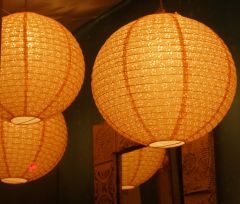June 18, 2007
Missed Father's Day Entirely

I have been mightily distracted of late by p&s's, inspections, strategic bargaining, green heat exchangers and offspringiy comings and goings, so, although I wrote this little piece in a timely fashion, I never published it. Now Fathers' Day is gone for good. Any here's thoughtful gift suggestion for any survivalists, bird flu true believers, or boy scouts, on your list.
Many moons ago, I wrote about the lantern that Engineers Without Borders had developed to extend the working/educational day for those who have expensive, dangerous or no light at all after sunset. "Living on Earth" (a crucially important program which, for some reason, is broadcast at the ungodly hour of 7AM Sunday morning on our local NPR station) broadcast an interview with Mark Bent, inventor of the BoGo, a bright, solar powered flashlight.
BENT: The World Bank estimates 1.6 to 2.2 billion people, so we're talking one third of the world is off the grid. And if you're off the grid you have to rely on three things: kerosene, candles, and conventional flashlights. Now kerosene is bad for the environment. It's bad for people breathing in the fumes. 1.6 million people, mostly women and children die of cancer each year because of the fumes from kerosene. One kerosene lantern puts out 100 kilos of carbon gases a year. And so you talk about the number of people that use kerosene lanterns and so that's really bad.And the other issue is even here in the United States most people don't recycle their batteries. EPA states that less than one percent of our landfill waste is batteries but it's our number one contaminant for ground water contamination with mercury and cadmium and all the other heavy metals that go into the ground water. But with my flashlights they use three nickel cadmium batteries. Right now the batteries will last 750 to a 1000 nights. And so a child or an adult can use the lights for six to seven hours a night for two years plus before the batteries need to be replaced. So we'll ship in more batteries and do a replacement program to get the batteries out of Africa.
GELLERMAN: There are a number of companies that actually make solar flashlights. What makes your idea so special is, well, is the marketing.BENT: Yeah, what I wanted to do was to get lights to people that really needed them that couldn't afford them. The World Bank estimates that the average African spends up to one third of their income on kerosene. But look at the economic benefit to an African. If you're taking away 30 percent of their expenditures you're giving them a 30 percent raise basically because no longer do they have to pay for the kerosene. You're allowing them to have a massive economic upgrade in their lives.
Africans aren't stupid, they just don't have capital. They don't have the ability to put things on a credit card, for example, like we do. And so if you give them a 30 percent increase in their disposable income they'll spend it on an extra chicken or they'll spend it on extra land to grow tomatoes or maize. And they will be able to leap out of that bottom level of poverty because it gives them that little bit of a head start. All this does is give them that head start which I think is fantastic.
If you buy one Bogo for $25, they will send a matching BoGo free to a family in a country of your choice via an affiliated charity. Or you can support one of our ill supplied troops in Afghanistan or Iraq if you prefer.
Buy it and watch the Fox News (!?!) movie at BoGo's website.
Don't like that idea? How about a pocket chain saw. I personally covet one of each .
Photo note: Light, not the third world variety.
Posted by Dakota at June 18, 2007 10:02 AM